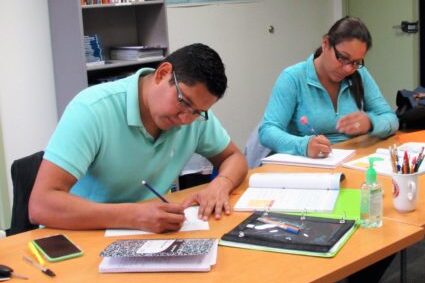Has it been “raining cats and dogs” in your neighborhood recently? Do you think learning English is “a piece of cake?” Or have you been “feeling under the weather” with summer allergies?
The Rule of Thumb Is There Are No Rules
Idioms, expressions, colloquialisms are so commonplace the average native speaker of a language hardly blinks twice at hearing or using them. Meanwhile, students new to a language struggle to grasp phrases like “beat around the bush,” “we’re fed up,” and “pull someone’s leg.” You could even say these expressions throw non-native speakers for a loop! Given our frequent internet interactions, English morphs into a more idiomatic language every day, making English as a Second Language (ESL) programs vital for millions of immigrants.
Libby Baumchen, ESL Manager at the Durango Adult Education Center, has taught her native language for 14 years. She uses idioms in the classroom to help students spark discussion, expand their vocabularies, and observe surprising comparisons between their different languages.
“English is a difficult language to learn. It isn’t phonetic. It comes from so many different sources,” says Baumchen. And she notes the language’s lack of reliable rules. “We can say there are expectancies—what you can expect the language to do but not many rules.”
On average annually, the ESL program at the DAEC serves 60-70 students representing as many as 17 different countries, including China, Thailand, Malaysia, Spain, Nepal, as well as many South American nations. Starting in the fall, the Center will expand its ESL services to Cortez.
To Coin a Phrase
Learning or improving English enables many immigrants to elevate their job potential, seek higher education, and get more involved in their local community. In fact, a 2015 study by the Household Data Annual Averages & Science and Education Center of North America found that immigrants with limited English proficiency earned nearly 18% less than those who were fluent.
And to gain fluency, students must grasp the rolling snowball that is informal English. Baumchen notes, “We don’t all speak like grammarians at the grocery store. Idioms are a key piece in teaching students the conversational English that they really need.”
The ESL program is funded by local funders like the Moniker Foundation, LPEA, and Ballantine Family Fund. This kind of generous funding comes at a crucial time for two reasons. First, Colorado is the only state that does not provide direct funding for adult education, and second, federal funds are at an all-time low, plunging from nearly $900,000 between 2010 and 2012 to just $200,000 in southwest Colorado.

Baumchen points out that ESL classes are becoming increasingly essential in a more global world where the incessant flood of online communication is rapidly altering the look, sound, and function of the English language.
“English is already very complex, and today it is evolving so much faster,” she says.
You can help our newest community members by referring a student to our program, volunteering to tutor an ESL learner, or making a much-needed tax-deductible contribution because there’s no such thing as a free lunch. Remember: the ball is in your court!



